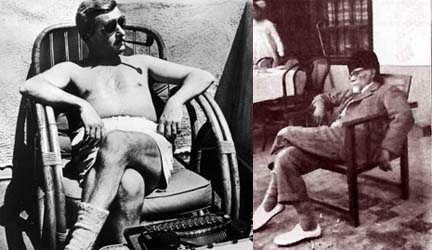
Videoconferencing Faulkner in Iraq
By Jennifer Howard, The Chronicle Online, June 24
Thanks to videoconferencing, literary criticism is playing a small part in the rebuilding of Iraq.
At the end of last year, Steve Wilson, a professor of English at Texas State University at San Marcos, got an email from a U.S. official working on provincial reconstruction in Iraq. Through contacts at Iraqi universities, the official had met some professors of English who wanted to find a way to talk to their U.S. counterparts about literature. So he went looking on the Internet for American professors who had experience that might be relevant and found Mr. Wilson, who had taught in a largely Muslim country, Malaysia.
Mr. Wilson and two of his Texas State English-department colleagues, Nelly Rosario and John Blair, were invited to talk with the Iraqi scholars via videoconferencing. The first conversation took place in March. To participate, the Iraqi scholars had to dodge curfews and be bussed at short notice to a location set up by U.S. authorities. Because of possible risks to their safety, the scholars’ identity has not been publicized. “All of this just to talk to some American professors,” Mr. Wilson said. “It’s very humbling.”
Once the video connection was made, what did the group discuss? Two short stories, “A Rose for Emily” by William Faulkner, and a story by Tomás Rivera, a Texas State alumnus, which the Americans had scanned and emailed over. All but one of the five or six Iraqi scholars who took part were female. “They wanted to talk about issues of portrayals of women in Faulkner’s story in particular,” Mr. Wilson said. “That led to discussions of feminism, and we tied that to Rivera’s portrayal of race in the United States. Eventually it was a discussion of multiculturalism.”
Some of the material and the Americans’ critical strategies for dealing with it were fresh to the Iraqis. “They did say that their curriculum stops around 1900, so much of this was new to them as teachers,” Mr. Wilson said. “What they told us is they really hadn’t thought about literary theory in the past 40 years—that really their exposure to it had stopped then.”
The Americans discovered that their Iraqi colleagues tended to take a more psychological approach to the stories. The Texas State scholars introduced some cultural theory. “We were most surprised by how quickly they picked it up and ran with it,” Mr. Wilson said.
For the next videoconference, each group of scholars picked one story by Kate Chopin, author of The Awakening. “We talked again about social context and women’s ability to define themselves,” Mr. Wilson said. “It was a remarkable discussion.” The Iraqis also wanted to know “why there’s such an interest in the United States in reading works by other ethnic groups,” he recalled. “We tried to talk about the fact that for most of us, that is our culture.”
Both groups want to keep the discussion going. The official who set up the initial videoconferences has moved on, and Mr. Wilson said it has been hard to find someone to step in to make arrangements. But the scholars are staying in touch and looking for another opportunity.
“We’ve exchanged emails and we’ve talked about what we might discuss in the future,” Mr. Wilson said. “I hear from a couple of them once a week saying, ‘Please don’t give up on us.'”